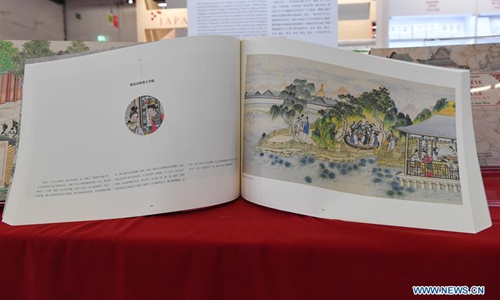The share of Hong Kong listed stock China Literature Limited declined 7 percent after the leading online literature platform in China was recently accused of violating the writers’ rights.

Photo taken on Oct. 17, 2019 shows an inner page of the Chinese limited edition of "Illustrated Classics of Chinese Literature: Dream of the Red Chamber by Sun Wen" at Frankfurt Book Fair in Frankfurt, Germany. (Photo: Xinhua)
The controversy stemmed from a newly emerged contract between the platform and the writers being exposed on the internet and company’s trial offering part of the content for free to readers, according to media reports. Writers fear this may set a bad example for the online writing scene and restrict the development of online literature in China.
The management team of the platform clarified that the contract was in fact released in September 2019. The company said providing content completely free to readers is impossible and unrealistic, trying the dispel the misunderstanding. It said it will revise the unreasonable clauses.
The new contract ignited controversy for its clauses that are believed to be beneficial to the platform but unfavorable to the authors, mainly by taking away the author’s copyright of the content.
According to media reports, the contract requires the authors to "unconditionally hand over all copyrights to the platform. The platform has the right to license the copyright without authors’ consent and will distribute no revenue with the authors."
The contract also stated that "the free lease of the content will be regarded as a promotion, not infringement," "authors must provide the platform with the outline, expected word count and time to finish the content," and "The platform has the right to operate various social accounts of the authors."
The contract has caused huge controversy on China’s social media networks. Many netizens and authors have criticized this contract, calling it an arbitrary clause.
The contract brought both an emotional and economic blow to the writers, an online writer pen-named Sanshuixiaocao told the Global Times on Monday.
“The biggest impact for middle- and upper-level authors is less income from copyright as the platform will take the animation, film and television adaption rights from the writers and do not need to share the revenue with the author,” she said.
She added that the main source of income for online writes is from readers’ subscription fees. “If the platform takes away the copyright of the work and offers the content to readers for free, it will be a blow to the content quality,” she said.
China Literature has signed a contract with more than 8 million writers. The subscription from the readers is halved between the platform and authors, according to media reports.
Law experts pointed out that if the authors completely hand over the copyright to the platform, the latter can use the copyright on its own without the permission of the author.
“The term arbitrary clause is not a legal term. The Copyright Law allows the transfer of property in intellectual property rights and the use of the work by the receiving party cannot be viewed as infringement with the author's consent,” Wang Qian, a professor of law with East China University of Political Science and Law told the Global Times on Monday.
Wang added that the contract needs to be concluded with the consent of both parties and if the author does not accept the contract terms provided by the platform, they needn’t sign the contract.
According to BigData's statistics, in 2019 China's digital reading market, China Literature ranked first with a market share of 25.2 percent.
“If the platform does not occupy a monopoly position, the author may consider cooperating with other platforms to publish works under suitable licensing conditions,” Wang said.


